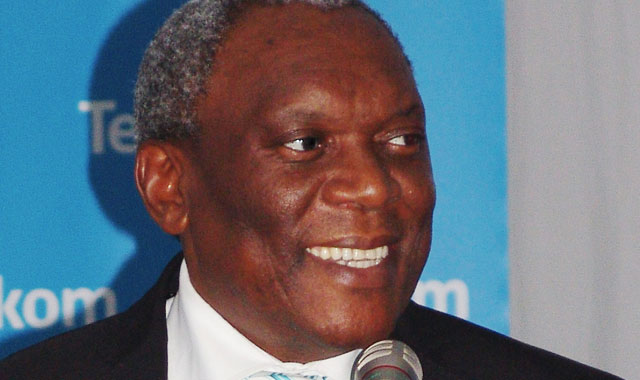
A plan to recover spectrum already allocated to mobile operators and a ban on the trading of frequencies in popular spectrum bands are among the policies contained in government’s new ICT policy white paper that are likely to raise the hackles of industry players.
The white paper has proposed sweeping changes to the way radio frequency spectrum is managed and allocated in South Africa, introducing a model that turns its back on best practice adopted by most of the rest of the world.
Instead, government is borrowing heavily from models applied in Mexico and Rwanda, telecommunications & postal services minister Siyabonga Cwele told TechCentral on Sunday.
Government intends abandoning the model of licensing exclusive-use spectrum to mobile operators. Instead, the spectrum will be pooled and given to a new wholesale open-access network operator to be owned by any licensee interested in participating as an investor and shareholder. Even more controversially, the white paper calls on the regulator to investigate how existing mobile spectrum assignments could be returned in according with the new policy.
“The regulator will be required, following adoption of this white paper, to conduct an industry-wide public consultation process to determine the terms and conditions, as well as the timeframe, under which the currently exclusively/individually assigned high-demand spectrum will be returned in accordance with this policy,” the white paper says.
“The regulator, upon completion of this consultative process, must make recommendations for the minister’s approval on the terms and conditions which will apply to the network and currently assigned high-demand spectrum.”
Vodacom and MTN have spoken out strongly against government’s plan to license all of the available high-demand spectrum to a wholesale open-access operator, while a number of smaller industry players have cautiously welcomed the move.
“The new spectrum management regime set out in this policy encourages that licensees work together as far as it is practicable,” the white paper says. “The value of sharing and collaboration between licensees is that it will result in the more effective use of a scarce resource (spectrum) and the reduction of the duplication of infrastructure while facilitating services-based competition.”
The white paper makes it clear that government is fully committed to the idea of a single wholesale network. “Without the policy shift set out in this integrated ICT policy white paper, and this particular spectrum and open-access framework, the specific challenges of extending access to rural and underserviced areas and lowering the cost of communication will not be achieved within the timeframes set out in [government’s] South Africa Connect [broadband policy] and the National Development Plan. This particular transformation is imperative to ensure inclusive economic growth.”
The white paper also proposes the banning of trade in spectrum assets that are in high demand, such as those that can be used for 4G broadband. “The trading of high-demand spectrum would perpetuate the current market structure, which places inherent value in the spectrum and its exclusive use. It would furthermore undermine the ‘use it or lose it’ principles and the application of open-access provisions to networks using high-demand spectrum.”

The white paper defines high-demand spectrum as spectrum where demand for access exceeds supply or where it’s already been fully assigned.
All high-demand spectrum will be assigned on an open-access basis and all currently unassigned high-demand spectrum — including spectrum in the 700MHz, 800MHz and 2,6GHz bands — will be set aside for assignment to the open-access network provider.
Some of the key statements and policy positions on spectrum in the white paper include:
- “A fundamental problem is that although over 400 players hold electronic communication network service licences, which would give them the right to apply for the available spectrum, only six have been assigned mobile spectrum, obtained through various licensing processes undertaken in terms of the management liberalisation dispensation. The outcome is an oligopoly — a highly concentrated market where only a few firms dominate. Due to the scarcity of spectrum, not all licensees could be assigned spectrum in the ‘high-demand’ bands. This has had an adverse effect on the entry of additional [network] licensees into the market. The lack of application of open-access principles has further inhibited the market at the services level.”
- “Spectrum has effectively become the private property of a few and serves as an entry barrier for operators who do not have access to it. This has been exacerbated by a regime that does not adequately define the entities’ rights to the assigned spectrum, with an unintended consequence that there is a perception that spectrum permanently belongs to the assigned entities. This should not be the case…”
- “Since 2007, proposals have been made to issue future spectrum through market-based approaches such as auctions and hybrid competitive bidding/auction processes. Such approaches, though, would maintain the status quo and spectrum scarcity would be exacerbated — with the scale tipped in favour of those licensees that have the financial muscle to pay for it.”
- “In a developmental state context, the highest value for the spectrum may not be measured in terms of monetary value — social and economic value are of greater importance. Furthermore, a market-based approach may simply serve to perpetuate the current market structure in that those with the deepest pockets and ability to pay for the spectrum are likely to be those who have derived economic benefit from their exclusive rights to the spectrum to date.”
- “Neither proposal — comparative bidding or auction — upholds the principles of openness and transparency that this white paper espouses; nor do they address the fundamental market problems of ineffective competition, infrastructure-sharing bottlenecks, duplication of infrastructure and inefficient use of scarce resources. This therefore creates a need for a policy reform towards a more open approach in addressing challenges of spectrum management to meet the goal of broadband for all.” — © 2016 NewsCentral Media




